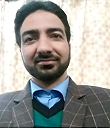FROM HOD’S DESK

Mr. Mohammad Ashraf Mir (Assistant Professor) Head of Department
Department of Education was established in 2004 with the inception of the college itself. The mission of this department is to enlighten the young generation with the academic, scientific and moral education to make them the best and responsible citizens of the society.
ABOUT THE DEPARTMENT
|
Year of Establishment
|
2004
|
|
Number of Batches Passed since Establishment
|
14
|
|
Faculty Strength
|
03
|
|
Sanctioned posts
Posts occupied
Academic Arrangements
|
03
03
00
|
|
Course
|
B. A
|
|
Introduction of Semester System
|
2015
|
|
Introduction of Choice Based Credit System
|
2016
|
|
Combinations Offered
|
Sociology, Urdu Literature, Economics, Philosophy, Political Science, Geography, Mathematics, Psychology, History, Computer Application, Kashmiri Literature, Statistics, Arabic, Persian
|
|
Subjects Offered
Discipline Specific Electives
|
Sociological Foundations of Education
Psychological Foundations of Education
Philosophical Foundations of Education
Development of Education System in India
Issues and Trends in contemporary India-I
Issues and Trends in contemporary India-II
|
|
Skill Enhancement Courses
|
Early Childhood Care and Education
Educational Technology
Guidance and Counseling
Inclusive Education
|
VISION
· To create a sarvodaya Samaj with the main principles of Humanism
· To develop the civic sense among the students
· To develop the attitude of fatherhood of God and brotherhood of man
· Universal goal oriented modification of behavior
MISSION
· Harmonious development of personality of the students
· To prepare the students to break the walls of separation and spread the hands of cooperation
· To provide vocational and educational guidance to students in order to make them self-reliant
· To develop the power of analysis in students in different fields of life
YEAR WISE ROLL STATEMENT OF THE DEPARTMENT
|
Year
|
Number of Students
|
|
2013-2014
|
2031
|
|
2014-2015
|
2018
|
|
2015-2016
|
2042
|
|
2016-2017
|
2392
|
|
2017-2018
|
3079
|
|
2018-2019
|
3008
|
YEAR WISE PASS PERCENTAGE OF OUTGOING CLASS OF THE DEPARTMENT FROM 2013-2018
|
Year
|
Pass percentage
|
|
2013-2014
|
92.01%
|
|
2014-2015
|
93.98%
|
|
2015-2016
|
87.02%
|
|
2016-2017
|
90.20%
|
|
2017-2018
|
85.94%
|
|
2018-2019
|
91.01%
|
AVAILABLE DATA OF STUDENTS FOR PROGRESSION TO HIGHER EDUCATION AND PLACEMENTS
|
Courses and Placement
|
Number of Students
|
|
M.A Education
|
35
|
|
M.ED
|
13
|
|
M.Phil. Education
|
02
|
|
Ph.D. Education
|
03
|
|
NET/JRF Education
|
04
|
|
SET Education
|
05
|
|
Assistant Professors
|
03
|
|
Lecturers
|
04
|
|
Teachers
|
10
|
SPECIAL CONTRIBUTION OF THE DEPARTMENT FOR THE SOCIETY
· Remedial teaching to the disadvantaged students
· Donation of personal books of faculty to the needy students
· Guidance and Counseling for outgoing students for qualifying different competitive exams
· Contact classes for B.Ed. Students
· Working as external supervisors for final teaching practice of B.Ed. students
SWOC ANALYSIS
Strength
· Student enrollment drastically rising every year
· Well qualified, experienced and dedicated faculty
· Students are highly obedient and sober
Weakness
· Departmental library not available
· Educational Psychology laboratory not available
· No separate building for the department
OPPORTUNITIES AND CHALLENGES
Opportunities
· Enough Opportunities for students to get job easily in public and private schools and institutions of higher learning
· There is enough scope to go for the research in education
· Ample opportunities to work with Councilors’, NGO’S, and in social service Communities
Challenges
Although a large number of students get enrolled every year in the department, the present situation poses a great challenge in fulfilling their educational needs.
FUTURE PLANS
· Introduction of Diploma courses in the following fields
o Guidance and Counselling
o Special Education
o Teacher Education
· Establishment of Guidance and Counselling Cell
· Establishment of Educational Psychology Lab.
· Establishment of Separate fully equipped departmental library
· National Conferences/ Seminars on various educational issues